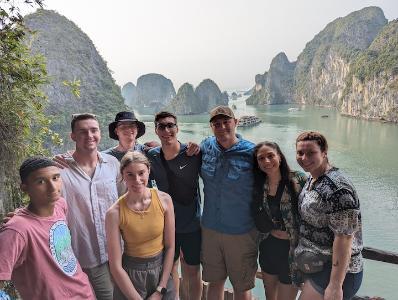Cadets Dive into Vietnamese Culture For Spring Trip

Cadets enjoy the view overlooking Ha Long Bay. — Photo courtesy of Col. Houston Johnson.
LEXINGTON, Va. April 18, 2024 — Eight 1st Class commissioning cadets at Virginia Military Institute, along with their faculty leadership team, Lt. Col. Jochen Arndt, Col. Houston Johnson, and Col. David Gray, toured the Socialist Republic of Vietnam during spring furlough as part of the Olmsted Foundation’s Undergraduate Program, which offers substantial funds for overseas travel and cultural immersion opportunities to senior military college students.
The fully funded trip was co-sponsored by VMI’s Department of History, the John A. Adams ’71 Center for Military History & Strategic Analysis, and the Center for Leadership and Ethics. Assistance was provided by the Office of Global Education. Cadets were chosen through a rigorous application process based on their GPA, ROTC ranking, a written essay, and personal interview.
According to Arndt, the Olmsted Foundation’s mission for their undergraduate program is to “provide future military officers their first overseas experience in a non-English speaking country, with exposure to a national perspective, and a focus on the role of U.S. policy in the region. That is our mission too. Prior to this trip, only two of the cadets in our group had ever travelled to another country, and one had never flown in an airplane,” he said.
Initially, the leadership team chose to visit the country of Turkey, but changed their plans when unrest flared up in the Middle East last October. “We had to commit to a trip and put down non-refundable deposits by early December, so we decided to be prudent and return to Vietnam, which we visited in 2019. It’s a place where we know the cadets would receive a good experience. It is culturally, meteorologically, and linguistically foreign, giving cadets a challenge to deal with those differences. Vietnam provides this experience like no other country. It is extraordinarily different,” said Arndt. In years past, cadet groups have gone to Germany, Poland, Israel, Serbia, Bosnia and Herzegovina, and last year to Japan.
The cadets prepared for the trip in the early part of the year by ensuring their passports were in order, getting recommended immunizations, learning safe travel practices, and attending lectures and reading seminars on Vietnamese history, politics, and national security. A rough itinerary was planned by leadership, but cadets provided proposals for additional stops, and were responsible for arranging them.
The group made the Old Quarter in Hanoi, an area known for its numerous attractions, rich cuisine, and round-the-clock activity, their base of operation. They explored the city of Hanoi where they saw the Temple of Literature, the oldest university in Vietnam; watched a water puppet show at Thang Long Theatre; and visited the U.S. Embassy where they met with Col. Thomas Bouchillon, defense attaché, who provided a briefing on U.S.-Vietnamese relations. They toured Hoa Lo Prison Museum, commonly known as the “Hanoi Hilton,” where American POWs—including John McCain—were confined during the Vietnam War. They embarked on a two-day cruise to Ha Long Bay, a United Nations Educational, Scientific and Cultural Organization World Heritage Site, popular with tourists for its emerald water and thousands of towering limestone islands. Barbara Keating ’24 shared that a highlight of the trip for her was visiting a pearl farm in the middle of Ha Long Bay.
“We could see oysters in nets, people extracting the pearls from the oysters, and others valuating the pearls,” she said.-865x216.jpg)
The group visited the rural family home of their tour guide in the small farming town of Ninh Binh, where they helped prepare a meal. Zachary Wallace ’24 described the experience, “We walked a mile through small streets and arrived at the house, where our guide’s in-laws were busy working around the house to prep for lunch. They met us with smiles, and without speaking a shared language, put us to work helping make lunch. I was in a group that cut and cleaned banana leaves to be used as plates; cleaned and dried lettuce and herbs; as well as place heaping piles of pork, duck, chicken, and greens onto the banana leaf platter. Without understanding the language, I learned traditional Vietnamese techniques, and conducted liquor diplomacy.”
Johnson agreed that preparing a meal with a Vietnamese family was a wonderful way for the cadets to learn their way of life. “The trip offered cadets wonderful opportunities to immerse themselves in Vietnamese culture, learn about the United States’ engagement with the region, reflect on what the Vietnamese call the “American War,” and discuss contemporary geopolitical and national security issues. Cadets threw themselves into the program,” he said.
One poignant moment Jacob Clift ’24 experienced was when he left a generous tip to a pregnant vendor from whom he bought souvenirs in Hanoi. “The tip moved her to tears. This heartfelt exchange taught me a profound lesson about the Vietnamese people. They show deep appreciation and demonstrate immense gratitude for even the smallest gestures. Each encounter during my journey served to deepen my admiration for the country and its resilient people,” he shared.
Gray was pleased the Olmsted trip successfully achieved its mission. “In Hanoi, the cadets quickly adjusted to the frenetic motor scooter traffic on the streets, visited many historical and cultural sites, and learned to navigate in the city’s markets without the guide’s help,” he said.
Plans for next year’s trip begin immediately. The destination country has not yet been decided, but Turkey is still being considered.
Marianne Hause
Communications & Marketing
VIRGINIA MILITARY INSTITUTE
.svg)
.png)